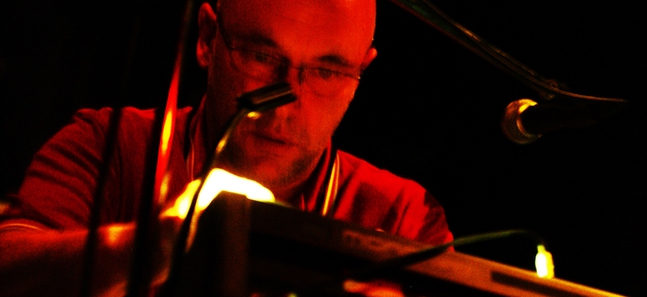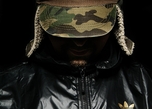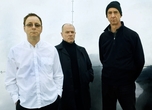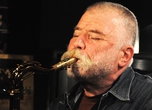Adrian Sherwood: the interview
The dub veteran talks On-U Sound, Lee Perry and Ari Up

Posted: Fri Dec 02 2011
Born in the studios of Jamaican producers like King Tubby, Errol Thompson and Lee 'Scratch' Perry, dub didn't take long to travel overseas. One of the first places it took root was in the UK, where the music became popular amongst members of the burgeoning punk movement, while London-based producers including Adrian Sherwood and Mad Professor pushed it to sonic extremes that its Kingston creators had never dreamt possible. In 1980, Sherwood inaugurated his On-U Sound imprint with the release of the debut album by New Age Steppers, a loose collective fronted by The Slits vocalist Ari Up, and the label would become synonymous with adventurous, shape-shifting bass music. Over the ensuing decade, it found space within its remit for sounds as diverse as African Head Charge's psychedelic Afro-dub and Tackhead's industrial hip hop, and went on to champion Japanese electro-dub group Audio Active during the 1990s. As a producer, meanwhile, Sherwood found himself working with everyone from Nine Inch Nails to Lee 'Scratch' Perry himself.
After a patchy output during the 2000s, On-U Sound has been enjoying a resurgence of late. There's been a string of reissues to mark the label's 30th anniversary, but some of the new material coming out is equally noteworthy. Following on from Nu Sound & Version, in which producers including Digital Mystikz and Kode9 reworked tunes by Lee Perry, the first release of 2012 will be an album of new material by New Age Steppers. The poppy, eclectic Love Forever is lent added poignancy by the fact that it was the last thing Ari Up recorded before her death from cancer last year, at the age of 48.
Sherwood heads to Tokyo this month to play at an On-U Sound all-nighter, where he'll be DJing and also manning the sound desk during a live set by Audio Active. Time Out called him at his home in England to talk about the history of the label, working with your heroes, and going deaf for a living...
Can you tell us a bit about how On-U Sound started?
I'd just finished running a label called Hitrun, and I'd done another label called 4D Rhythms that I literally released one record on – which is called Starship Africa, by Creation Rebel. In that period, we did lots of gigs where we'd have The Slits, members of Generation X, The Sex Pistols, all in the audience watching our shows… and The Clash, too. In '79 we got invited on The Slits tour, and then a Clash tour, so I started meeting people who were from outside my area. By the time On-U started, I'd recorded members of what became Public Image [Ltd.], The Slits, The Raincoats – all playing on records with members of Creation Rebel, Roots Radics, all sorts of different people, all of whom previously wouldn't have met. That reflected a lot of what was going on in England at the time, with the so-called punky reggae party. I think just by the fact that I recorded a lot of those people, it made the label look really interesting.
Do you think it's fair to say that the label's had a few ups and downs over the ensuing years?
Yeah, well, I think that happens with any label. If you get successful – which we never did (laughs) – then you employ more staff, and then you have to keep selling more records. Whereas with me, I was making records for myself, not really trying to make records to please other people. I didn't really sell a lot of tunes, so I didn't really have the problem a lot of big labels did that got too popular, and then had a break-and-bust kind of thing.
What's the reception been like for the reissues?
Well… It's nice to say this: we've got a lot of love all over the place. (Laughs) Like a hippy idiot or something. We've got people all over the place who are really fond of the label. The reissues we did, people were like, "Oh, that's nice, glad you're back in business." And the new releases – we did that African Head Charge, Voodoo of the Godsent, and then we followed that up with this new Lee Perry, Nu Sound & Version. We've got consistent artwork again, and a consistent flow of releases. The feedback we've had has been very healthy: basically, people are pleased to see that there's a good standard of new stuff coming out.
Are there any albums in the back catalogue that you feel should've got more love than they actually did?
Well, a lot. The problem I've got is that a lot of the things I made, I ended up licensing to other labels, thinking they'd do a better job than we did. And initially, they had the money to promote them, which I couldn't do, but consequently I lost the rights for certain territories. So things like Bim Sherman's Miracle album: I think that should've been a massive album.
How did the latest New Age Steppers album come about?
[Ari Up and I] didn't speak for a few years, because she was living on the other side of the world, and other things happened with her family and whatever. Several years ago, we started seeing each other in England again, and we did a bit of recording. In 2008, she told me she'd been diagnosed with breast cancer, but she was very positive about it at the time, and she said: Look, I want to finish the recordings that we started, and I'd come to Jamaica, and we'd do it in her house. We did the bulk of that album in her kitchen, on a laptop, with my engineer at the time [Brendon Harding]. She played most things on it as well – programmed it and everything. I'm quite proud of it. I think it's quite charming.
Are there any recording sessions you've had in the past which have gone especially well or badly?
They never go badly, really. I can never say I've had a bad one. The problem we've had in the past is where record companies are instigating expensive remixes, and the band doesn't come and they don't tell the band, or the band can't be bothered to come – these mad things used to happen in the '80s, it was just like absolute extravagance, out of control. But every time I worked with a band and they attended the mix, it was good. With my own stuff, something like Mark Stewart's Learning to Cope With Cowardice or that first New Age Steppers album, or working with Lee Perry for the first album, Time Boom [X De Devil Dead]… I've been a very lucky person, working with a lot of my heroes and stuff. It's been brilliant.
Was it quite daunting, working with Lee Perry the first time?
Not really, because he's got such a creative surge. And at the time, I was – what? – 27 or something, and in my conceited way I thought I could change the world. He originally presented some tracks of his, which were cover versions, all like Bob [Marley] songs and stuff, and I was like, "Hang on a minute: check these out" and put on some of our multi-tracks that I'd co-produced with [Dub Syndicate drummer] Style Scott. They were amazing tunes, he just loved them, so then we started working… I think Lee knows that I've got his interests at heart. I'd like to think he knows that. I wasn't just going to let him babble any old thing – I made sure we got really cohesive work out of it.
Is your set at the Tokyo gig going to be a retrospective kind of thing?
No, I'll play a few old On-U ones, a lot of new stuff and unreleased things. I'm working it almost like a sound system now, where I want to play things no one can play back at me. I've got a few mates who make tunes: I've got dubplates with Digital Mystikz, Congo Natty, Kosheen and a few other people; I've got my own unreleased stuff, from different versions that no one can play back, and then I'm mangling it all up with reverbs and delays and sound effects. The idea, basically, is operating like the old sound men, where you've got your own productions that are unique to you. So when I play out, the crowd's entertained by at least hearing a different cut or a unique tune – and then I'm peppering that with some classic old Jamaican and some contemporary tunes as well.
You've got some well-known Japanese dub acts appearing at the show, too. What was your first encounter with Japanese dub?
Audio Active were the pioneers, as a live dub act. Obviously there's Dry & Heavy, who are a great band as well, but in their day Audio Active were much more maverick: they had ingredients of Hendrix and Funkadelic mixed with bits of King Tubby, all gone through a kind of video game. They were actually very refreshing. I don't know how familiar you are with their stuff, but they made some really charming tunes.
I'm honestly more familiar with Dry & Heavy…
The early Audio Active is fucking great, really. We toured all around the world together. They're more international than almost any Japanese band: I did the States with them, New Zealand, Australia, Germany, France, Italy, Holland – they've been everywhere. And they were getting fans all over the shop, it's just bloody expensive shipping a load of Japanese lads to the other side of the world. But they were lovely. I love Audio Active.
You're doing sound for them too, right? When was the last time you got behind the mixing desk?
Yesterday. I did three shows with the Pop Group in Madrid, which was the first time I've ever mixed them – doing live sound. Generally I do it for Lee Perry every now and then, if they hire me to do it, or I do it for Mark Stewart. But front-of-house sound is really not great for your ears, I've got to be honest with you. I love doing it, but I can't do it week in, week out or I'll be deaf as a post. Deafer than I am already.
On-U Sound 30th Special, Dec 9, Sound Museum Vision. 'Love Forever' by New Age Steppers is released in early Jan 2012
Tweets
- About Us |
- Work for Time Out |
- Send us info |
- Advertising |
- Mobile edition |
- Terms & Conditions |
- Privacy policy |
- Contact Us
Copyright © 2014 Time Out Tokyo














Add your comment